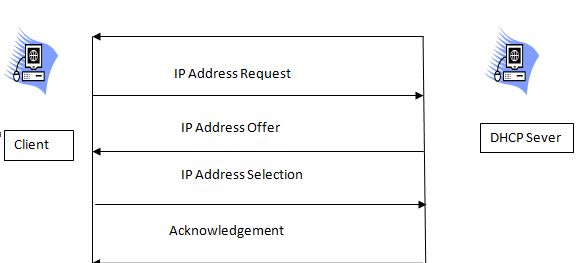DHCP – Dynamic Host Configuration Protocol
1. Static Address Allocation: In this client request for the static IP address request from DHCP Server. And DHCP server has a database that statically binds physical addresses to IP addresses.
- DHCP (dynamic host configuration protocol) provides static and dynamic address allocation that can be manual or automatic.
- DHCP is built on a client-server model, where designated DHCP server hosts allocate network addresses and deliver configuration parameters to dynamically configured hosts.
- DHCP provide two types of address Allocation.
2. Dynamic Address Allocation.IN dynamic allocation DHCP has a pool of available IP addresses. When a client request for the IP addresses temporarily, DHCP server goes to pool available of addresses and assign an IP address for a period of time. Dynamic IP address is need when host moves from network to network or disconnected from a network at this time DHCP provide temporary IP address for a limited time.
- DHCP architecture consist of three part
1) DHCP client
2) DHCP Server
3) DHCP relay Agent
- DHCP client provides facility to communicate with DHCP server and get IP address and configuration property. As shown In Figure IN this first client sends a request to DHCP Server using ‘request’ for IP address. After That Server find IP address send back to Client. Now client select one IP Address and send it to server for lease of time and at last server acknowledge it to Client so client use it for a lease of time period.

- DHCP client and server use this type of message for communication,
DHCP discover-send client to server for discover IP address,
DHCP Request-Send from client to server for IP address request
DHCP Pack sent from server to client for acknowledgment
DHCP Release sent from client to server for Release IP address.
- DHCP server provides facility scope, reservation. In scope it have
Scope name when it is created, lease duration, pool of IP addresses assign when request come etc. And in reservation we can assign an IP addresses for a particular computer. It means that when that particular Computer demand IP address it will get same IP address lease.
- DHCP option is a parameter use when server configure with client. her are 4 types of option,
1) Server option: These options apply to all scope. It’s basically when all clients on same subnet required same information.
2) Scope Option: These options apply to whom take a lease for a particular scope. For example option assigns to default gateway.
3) Class option: it applies to whom is a member of particular vendor.
4) Reservation option: Apply for single reservation client and required reservation in active scope.
- Some default option are like these,
1-subnet mask,
3-router,
6-DNS server,
15-Dns Domain name etc.
- DHCP relay Agent: A DHCP relay agent is doing job to pass message between DHCP client and DHCP server according to RFC2131. DHCP relay agent can be a hardware device or a software program.
- And at last before DHCP, BOOT P protocol is use in which when a change in physical or IP address administrator need to manually enter change .DHCP overcome this problem using both manual and automatic configuration. Static Address can create manually and Dynamic address can created automatically.
- DHCP use UDP port 67 for sending data to server and UDP port 68 for sending data to client.













